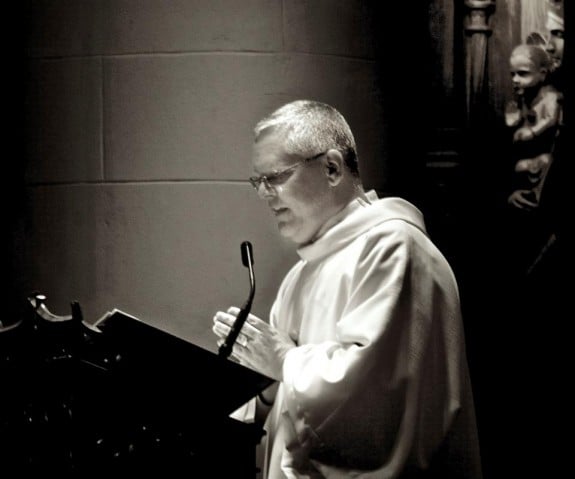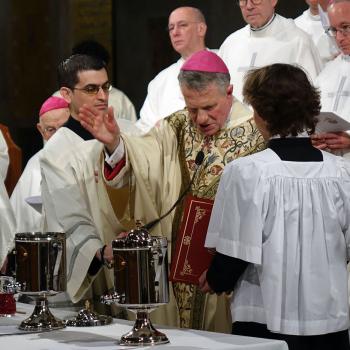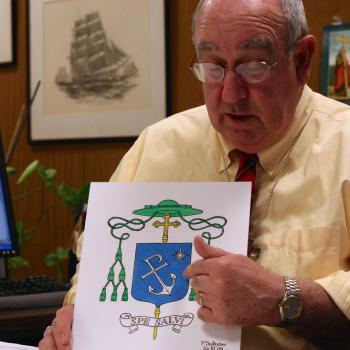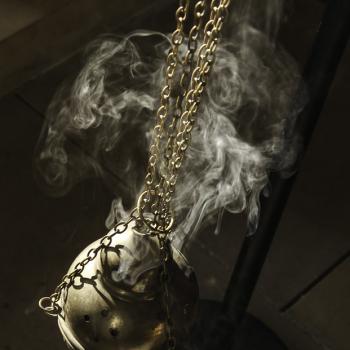I’m sure this situation is more common than we think. On an online forum for deacons, one member wrote:
Our music coordinator at my parish assignment told me that the choir will sing the Exsultet and that I would not need to be concerned with it this year. They where going to try it with a new music composition, and besides they spoke with our priest as well, all before speaking to me.
This deacon was, understandably, upset. He says he has been chanting the Easter Proclamation without any complaints from the pews from several years. He was wondering what he should do.
As most deacons know—but some priests and music directors don’t—the Exsultet is, first and foremost, to be proclaimed by the deacon. (Much like the proclamation of the gospel at Mass should be done by the deacon or, if no deacon is available, a priest who is not the celebrant.)
The rubrics for the Easter Vigil note:
The Deacon, after incensing the book and the candle, proclaims the Easter Proclamation (Exsultet) at the ambo or at a lectern, with all standing and holding lighted candles in their hands. The Easter Proclamation may be made, in the absence of a Deacon, by the Priest himself or by another concelebrating Priest. If, however, because of necessity, a lay cantor sings the Proclamation, the words “Therefore, dearest friends” up to the end of the invitation are omitted, along with the greeting, “The Lord be with you…”
The liturgical guidelines make clear a lay person should do it only “because of necessity,” i.e., if there is no deacon available or if the deacon or priest cannot carry a tune.
While I suppose it’s not beyond the realm of possibility, there are no allowances made here for a choral chanting of the Proclamation. It’s written as a solo act—which in the stillness of the moment only heightens the beauty and power of its message. It’s not a song to be enjoyed; it’s good news to be proclaimed!
Fr. Michael J. Flynn, writing for the USCCB, captured the singular importance of this great chant—and underscored, as well, the rubrics:
As is fitting for a text of this importance and solemnity, the Exsultet should always be sung – unless singing it worthily would be truly impossible. The chant notation in the Missal is not difficult to sing, but the Easter Proclamation is lengthy, so preparation and practice well in advance is essential. It is also important to take note of the rubrical instructions concerning the Exsultet which are contained in the Missal. Deciding which of the various options best suits a given community and the capabilities of its ministers will go a long way to ensuring a rendition of the Exsultet which is both dignified and evocative of joy. As the rubrics indicate, intoning the Exsultet is primarily the responsibility of the deacon. In the absence of a deacon, it may also be sung either by the priest who is presiding, or by a concelebrant. However, if local circumstances suggest it, the instructions also permit the intoning of the Exsultet by a lay cantor, with certain indicated portions of the text being omitted. Finally, if the length of text proves daunting, the Missal also contains an abbreviated form of the Exsultet. These various options, together with the determination of which ministers will execute them, should be discussed early in the planning stages, and never left to chance at the last minute.
Certainly, it’s a pastor’s prerogative to decide who will chant the Exsultet—but a decision of this significance should be discussed beforehand, and the deacon shouldn’t learn about it from the music director. That’s bad form—both disrespectful and unprofessional.
But what should the deacon do?
He knows his pastor. He should find a way to broach this subject, tactfully and respectfully. He should remind him of the rubrics and the long, ancient custom of the church stretching back hundreds and hundreds of years, whereby the deacon has traditionally chanted the Exsultet—and is still called upon to be the first to do so. At the very least, he should let the pastor know that this caught him by surprise—and not in a good way.
However: as every deacon (and every person who works in ministry) knows, you pick your battles. And he’ll have to prayerfully consider if this is a battle worth waging, or if it will just cause more problems in the parish and among the staff than it is worth. Different sensibilities and personalities require a different approach.
A little prayer and discernment can’t hurt—along with the reminder that this sort of treatment really isn’t anything new.
After all: just look at what happened to the first deacon.
















